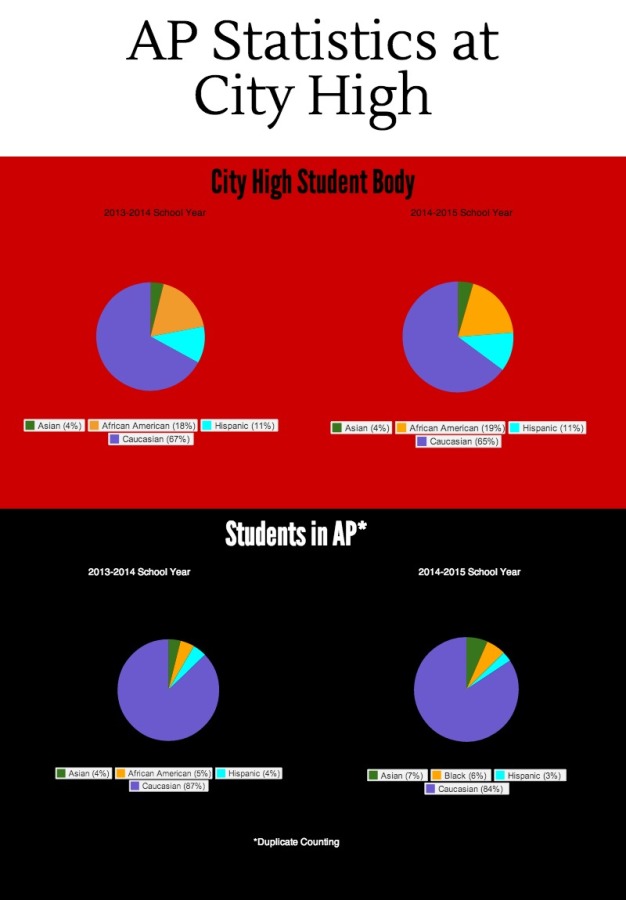Project Achieve Aims to Create AP Equality
After an investigative report last year by The Little Hawk on the national issue of minorities in AP classes, a new project to encourage minorities to take AP classes was formed
After the Little Hawk’s reporting of minorities being underrepresented in AP and Honors classes, City High Principal John Bacon encouraged the guidance office to implement a variety of programs to work towards bridging the inequality gap.
“(After) a wonderful story in the Little Hawk newspaper that did an examination of enrollment in our AP classes and compared it to the demographic makeup of the high school,” Mr. Bacon said. “We knew that we had work to do to make our enrollment in our AP classes more representative of the high school at large.”
Project Achieve was formed by City High guidance counselor Linda Hoel, and Kate Degner, an employee at the University of Iowa’s Belin-Blank Center for gifted and talented students. They created the program that is geared towards informing minorities about the AP programs at City High and encouraging them to sign up for AP and honors courses that they are eligible to take based on test scores. Project Achieve identified about 70 minority students, in grades 9-11, who were chosen for the program based on their academic performance.
“Last year, we organized, we did a mentorship with Southeast, we did a visit to the university, and we had a presentation from some AP students,” Linda Hoel, guidance counselor and coordinator of Project Achieve said. “That was about it because we started halfway through the year.”
This year, Kate Degner isn’t working with the program, but Mrs. Hoel has many more activities are planned including: continuing mentorships with South East Junior High students, going on a visit to the University of Iowa, and developing a communication center, a series of bulletin boards where information can be posted for the students in the group. The coordinators are also working on producing an AP video, in which they interview all the AP teachers and some AP students and take shots of the AP classes in action. The video will be shown to Project Achieve, and will also be available online for any students and parents that want to see it.
Minorities still are underrepresented in AP classes this year. However, Bacon is still optimistic about the future, because many of the students in Project Achieve were freshman last year.
“I think it’s really going to be next year or the year after when we really we see results. A typical freshman is maybe taking AP World History as a sophomore.” Mr. Bacon said. “When they are upperclassmen, juniors and seniors, is when I think we are really going to see the fruits of the effort on this, and see if these students are choosing to register for those types of college level, rigorous classes, when they are upperclassmen.”
Jens Dancer ‘15, a minority student that has taken multiple AP courses says that he has enjoyed taking AP classes, which have helped make him a better student.
“I have never really felt awkward in AP courses because of my race. I feel that anyone who wants to take the class can and should,” Dancer said, “I haven’t observed any prejudices in my classes.”
Mr. Bacon believes that diversity in AP improves the learning experience.
“I also believe in diversity very strongly, I believe that true diversity enriches everything that we do, and when any of our classrooms are fortunate enough to have true diversity in them, I think the entire learning environment improves,” Mr. Bacon commented, “When different cultures, different backgrounds, different experiences are represented, the classroom becomes a richer, more dynamic place; discussions become better, and that is why I’m a big proponent of diversity across the board, and certainly in our AP classes as well.”
AP US History teacher, Melanie Gibbens, agrees that AP course enrollment should be representative of the entire student body.
“It’s good to have a wide range of students, including kids who may not have considered taking an AP class, but then when you look at their test scores or their grades, they qualify,” Mrs. Gibbens said.
Your donation will support the student journalists of Iowa City High School. For 2023, we are trying to update our video and photo studio, purchase new cameras and attend journalism conferences.

I'm a senior, and this year is my third year on the Little Hawk. I'm back and I think pretty much everyone knows me at this point, but watch out for my...
































